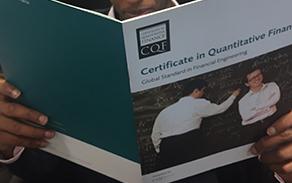Financial Modeling Course in Quantitative Finance

What is Financial Modeling?
Financial modeling is a process through which a mathematical model is developed as an abstract representation of a financial scenario. Commonly used in both corporate and quantitative finance, models provide ways to evaluate the value of an asset, the financial performance of an asset, and the risk-return relationships of assets in a portfolio, for example. Financial modelers employ a combination of mathematical and statistical methods in model development and use software packages, such as Mathematica, or R, or write code themselves to perform calculations and simulations. Popular languages include Excel/Visual Basic, C/C++, and Python.
How is Financial Modeling used in Quantitative Finance?
In the context of quantitative finance, financial modeling draws on a long history of model development, with various models and methods being applied to asset-specific problems. Quant models exist for equity valuation and option pricing, interest rates and bond yield curves, the effects of market movements, and portfolio performance. Models have also been developed to support innovations in finance, including structured products. A substantial literature has grown up around financial modeling, enabling quants to share information and critique specific models and methods. A range of quant models have evolved for the following applications:
- Equity valuation, including dynamics around dividends
- Option pricing and calculation of sensitivities via the Greeks (e.g., delta, theta, gamma)
- Interest rate, credit, and exotic derivatives
- Bond pricing and the term structure of interest rates and credit spreads
- Credit risk, counterparty risk, and regulatory capital requirements (e.g., stress testing)
- Various valuation adjustments (XVA)
- Structured product development
- Volatility, including local and stochastic volatility models
- Risk metrics, including Value-at-Risk (VaR), conditional Value-at-Risk (CVaR), and Extreme Value Theory (EVT)
- Asset allocation and portfolio optimization
The types of quant models in these categories make use of stochastic calculus, partial differential equations (PDEs), numerical methods, and complex algorithms. Increasingly, they also rely on computer simulation, such as Monte Carlo methods, and extensive data analysis through machine learning techniques applied to traditional and alternative data sets.
Financial modelers and quantitative analysts typically have a strong academic background (at least a bachelor’s degree, and often a master’s degree or PhD) in a quantitative discipline such as mathematics, statistics, physics, computer science, engineering, or operations research. Many quants also pursue further professional education through online courses.

The CQF: An Advanced Financial Modeling Course Online
The Certificate in Quantitative Finance (CQF) is a globally recognized professional qualification in advanced financial modeling, offered twice a year online. Launched in 2003, the CQF focuses on the development of mathematical foundations, financial acumen, and programming skills in Python that are in high demand in the financial industry today. The curriculum covers the theory and practical implementation of quantitative finance techniques and includes in-depth explorations of financial models for some of the major asset classes: equities, fixed income, derivatives, and structured products.
The CQF syllabus is always evolving in consultation with senior alumni and faculty to ensure it continues to meet industry needs. Recent examples of curriculum development include the addition of Data Science and Machine Learning modules in 2017 and the inclusion of a lecture on Quantum Computing in 2022.
The CQF has been trusted by over 8000 quant professionals from 90 countries around the world. The CQF offers a rigorous master’s-level education in six months, online, and part-time. It is an excellent option for busy professionals seeking to enhance their skills whilst continuing to progress their careers at the same time. Plus, a delegate’s learning journey does not end once they graduate. Upon completion of the program, CQF alumni gain permanent access to 900+ hours of further educational offerings through its Lifelong Learning library at no additional cost.
Financial modeling is an interesting and rewarding career path for those with the skills to thrive in a competitive job market. If you are interested in developing mastery in this field to progress professionally, the CQF is the ideal course for you.
Find out more about the CQF program
Download a brochure to find out more about the globally recognized CQF program. If you have any questions about the CQF, join the next online information session to get all of them answered by the Program Director.



